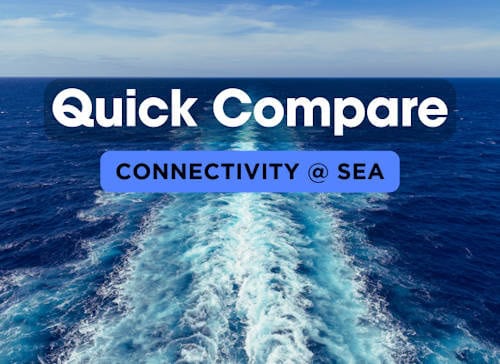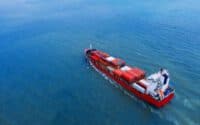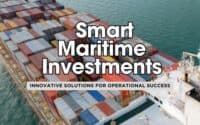Quick Compare: Internet Connectivity Options for Commercial Ships

In today's maritime industry, reliable internet connectivity is not just a luxury—it's a critical necessity for the smooth and efficient operation of commercial ships. Whether a vessel is navigating through busy shipping lanes or cruising across the vast oceans, consistent and robust connectivity plays a pivotal role in ensuring the safety, productivity, and well-being of both the ship and its crew. Here are key areas where reliable internet connectivity is essential:
- Communication: Maintaining open lines of communication between the ship and onshore offices is crucial. Reliable internet allows for constant contact, enabling real-time updates on voyage progress, operational changes, or emergency situations. This is especially vital for coordinating logistics, responding to unexpected events, and ensuring that the vessel stays on course.
- Navigation: Modern navigation systems rely heavily on real-time data. From weather updates to route optimization, reliable internet connectivity ensures that ships can access the latest information, helping to avoid hazards and optimize fuel efficiency. This connectivity also supports the integration of advanced navigational aids, such as GPS, AIS, and ECDIS, which are essential for safe and efficient passage.
- Real-Time Data Transfer: The ability to send and receive data in real-time is crucial for operational efficiency. Whether it's transmitting performance metrics, monitoring equipment remotely, or updating digital logs, real-time data transfer helps ship operators make informed decisions quickly. This also facilitates predictive maintenance, reducing the risk of unexpected equipment failures.
- Crew Welfare: The well-being of the crew is directly linked to their ability to stay connected with family and friends back home. Providing internet access for personal use is no longer seen as an optional perk but as a necessary part of maintaining morale on long voyages. This also includes access to entertainment, educational resources, and mental health support, which are vital for reducing the stress and isolation that can come with life at sea.
- Compliance with Maritime Regulations: Many maritime regulations now require the electronic submission of reports and logs. Reliable internet connectivity ensures that these compliance requirements are met promptly, reducing the risk of penalties or delays. It also supports the implementation of electronic certificates and documentation, which are becoming increasingly common in the industry.
** Please send suggestions/comments to editor @ shipuniverse.com **
Quick Compare
This guide explores the top internet connectivity options available for commercial vessels, providing a detailed comparison across five key areas. The tables below will help you evaluate different types of connectivity solutions, compare leading satellite providers, understand hybrid systems, assess cost versus performance, and analyze the operational impact of each solution. Whether you are navigating the open ocean or operating near the coast, these tables offer valuable insights to help you make informed decisions for your fleet.
| ShipUniverse: Connectivity Type Comparison | ||||||
|---|---|---|---|---|---|---|
| Solution Type | Coverage Area | Typical Speeds (Mbps) | Latency (ms) | Reliability | Cost Range | Best Use Cases |
| Satellite VSAT | Global | 10-100 | 500-800 | High | $$$ | Data-heavy applications, long-haul voyages |
| Satellite L-band | Global | 0.1-1 | 600-1000 | Very High | $$ | Basic communication, reliable in bad weather |
| 4G/5G (Near Shore) | Coastal | 10-300 | 50-100 | Medium | $ | Nearshore operations, high-speed requirements |
| Hybrid (VSAT + 4G/5G) | Global/Coastal | Variable (Depends on Connection) | Variable (Depends on Connection) | High | $$ | Cost-efficient, flexible connectivity |
| Wi-Fi and Cellular Boosters | Limited to Port and Coastal Areas | Varies based on signal strength | Low | Medium | $ | Enhancing connectivity in ports, near shore |
| ShipUniverse: Satellite Providers Comparison | ||||||
|---|---|---|---|---|---|---|
| Provider Name | Global Coverage | Bandwidth Options | Service Packages | Installation Complexity | Monthly Cost Range | Customer Support Quality |
| Inmarsat | Yes | Low, Medium, High | Basic, Standard, Premium | Moderate | $$$ | High |
| Iridium | Yes | Low | Basic, Standard | Easy | $$ | Medium |
| KVH | Yes | Medium, High | Standard, Premium | Complex | $$$ | High |
| Marlink | Yes | Low, Medium, High | Basic, Standard, Premium | Moderate | $$$ | High |
| Speedcast | Yes | Low, Medium, High | Basic, Standard, Premium | Moderate | $$$ | Medium |
| ShipUniverse: Hybrid Connectivity Solutions Comparison | ||||||
|---|---|---|---|---|---|---|
| Solution Type | Primary Connectivity | Secondary Connectivity | Automatic Switching | Total Bandwidth (Mbps) | Monthly Cost | Best for Ships |
| VSAT + 4G/5G | VSAT | 4G/5G | Yes | Variable (Up to 300) | $$$ | Long-haul, Coastal |
| Satellite + Terrestrial Backup | Satellite L-band | Terrestrial Network | Yes | Variable (Up to 100) | $$ | Ocean-going, Remote Areas |
| Wi-Fi Mesh + Satellite | Wi-Fi Mesh | Satellite VSAT | No | Variable (Up to 150) | $$ | Nearshore, Ports |
| VSAT + L-band | VSAT | L-band | Yes | Variable (Up to 50) | $$$ | Long-haul, Reliability-focused |
| Satellite + Cellular Booster | Satellite L-band | Cellular Network | No | Variable (Up to 20) | $ | Coastal, Ports |
| ShipUniverse: Cost vs. Performance | ||||||
|---|---|---|---|---|---|---|
| Solution | Initial Setup Cost | Monthly Operating Cost | Bandwidth (Mbps) | Coverage Area | Reliability Rating (1-5 Stars) | Crew Satisfaction |
| VSAT | $$$ | $$$ | 10-100 | Global | ★★★★☆ | High |
| L-band Satellite | $$ | $$ | 0.1-1 | Global | ★★★★★ | Medium |
| 4G/5G Near Shore | $ | $ | 10-300 | Coastal | ★★★☆☆ | High |
| Hybrid (VSAT + 4G/5G) | $$$ | $$$ | Variable (Up to 300) | Global/Coastal | ★★★★☆ | High |
| Wi-Fi and Cellular Boosters | $ | $ | Varies based on signal strength | Limited to Ports/Coastal | ★★★☆☆ | Medium |
| ShipUniverse: Operational Impact | |||||
|---|---|---|---|---|---|
| Connectivity Type | Impact on Navigation | Impact on Crew Welfare | Impact on Compliance | Data Transfer Capabilities | Overall Efficiency Improvement (%) |
| VSAT | Real-time updates, highly reliable | Excellent (Video calls, streaming) | Automated reporting, high compliance | High | 25% |
| L-band Satellite | Basic updates, reliable | Adequate (Email, low-bandwidth apps) | Manual reporting, moderate compliance | Low | 10% |
| 4G/5G Near Shore | Real-time updates, fast | Excellent (High-speed internet) | High compliance near coast | High | 20% |
| Hybrid (VSAT + 4G/5G) | Real-time updates, flexible | Excellent (Adaptive to conditions) | Automated reporting, very high compliance | High | 30% |
| Wi-Fi and Cellular Boosters | Limited to ports, variable | Moderate (Dependent on signal strength) | Moderate compliance, location-dependent | Variable | 15% |
Reliable internet connectivity is no longer an optional feature for commercial ships—it's a critical component that influences every aspect of maritime operations. From ensuring the safety of navigation and maintaining open communication channels to enhancing crew welfare and meeting regulatory requirements, the right connectivity solution can significantly improve a ship's operational efficiency and overall performance. By understanding the various types of connectivity options available, such as satellite, terrestrial, and hybrid solutions, ship operators can make informed decisions that align with their specific needs and budget constraints.

Do you have a Maritime Product or Service that may be of interest to Shipowners? Tell us about it here!
Do you have feedback or insights? Please reach out to editor @ shipuniverse.com



